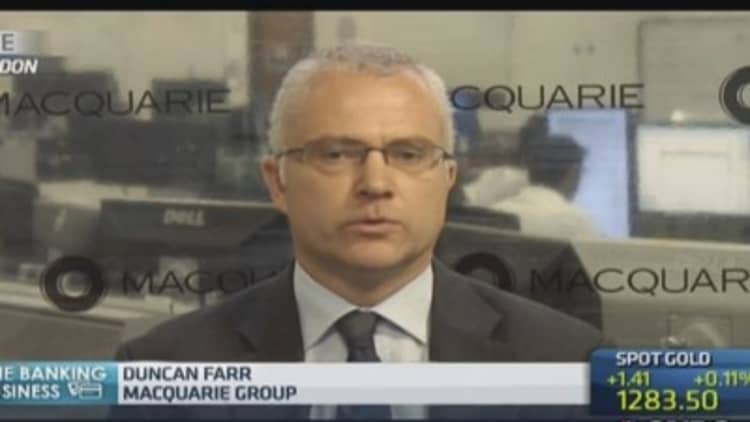After a devastating day in the stock markets for Portugal's troubled lender Banco Espirito Santo (BES), analysts are weighing up whether the country's central bank could step in and bail out the bank.
Turmoil at the group which owns BES has embroiled the lender for months with top officials being suspended this week over suspected "harmful management." BES shares lost around 40 percent on Thursday after Portugal's largest listed lender by assets posted a first-half net loss of 3.58 billion euros ($4.8 billion). This effectively wiped out the 2.1 billion euro capital buffer it previously stated it had available.
Then Friday came news from Reuters that Espirito Santo Financial Group, which owns BES, had announced that its Luxembourg-based division, ESFIL, had filed for creditor protection in Luxembourg.
Bill Blain, a senior fixed income strategist at Mint Partners believes that a state bailout of BES would convince him that "too-big-to-fail" lives on, adding that the whole issue of the unholy incestuous relationship between states and banking would reignite.

"BES is not a one-off. There will be others equally mismanaged," he said in a morning note.
"If Portugal bites the bullet and leaves the bank unsupported, it at least demonstrates some credibility about restoring the bank/sovereign divide and separating the problem components."
BES shares fell 9 percent on Friday as Citi downgraded its stock to a "neutral" from a high risk "buy" rating and Portuguese sovereign yields crept higher in anticipation that the central bank might have to prepare a bailout for the lender. BES's short-term debt also lost favor in the bond markets.
How did this all start?
The problems at BES began in May when BES' parent company, Espirito Santo International (ESI), received an audit by the country's central bank which showed "irregularities" in its accounts. The flames were fanned once again on July 10 after debt repayments to clients on commercial paper issued by ESI were delayed. Shares of BES and another part of the conglomerate, called Espirito Santo Financial Group (ESFG), fell sharply on the news and trading in both stocks were temporarily suspended.
The ownership structure of the Espirito Santo group is complicated, and has exacerbated recent problems. BES' parent company, ESI, owns 49 percent of ESFG, which in turn owns 25 percent of the BES. Thus, any problems at BES' parent companies also cause issues for the Portuguese lender.
Read MoreHere's what's happening in Portugal
Public support?
Reports from the country's Jornal de Negocios publication said that Portugal's central bank is doing everything it can to avoid public support for BES. However, it added that a "mixed" solution is being worked on that would bring joint participation of public and private funds.
The central bank drafted a statement after BES' earnings which underlined that the bank should opt for a capital increase with private investors. But it added that the "soundness" of the institution was safeguarded by the fact that there is a public money available. This public money is a 6.4 billion euro fund that is left over from bailout money given to the country back in May 2011. Portugal, ravaged by the euro zone sovereign debt crisis, received a joint financing package from creditors which it only exited back in May.
Read MorePortuguese banking mess shook a dynasty
Gildas Surry and Geoffroy de Pellegars, two credit analyst at BNP Paribas, touted the idea that a "bad bank" could be set up, which would take over bank's problematic assets, funded by the resolution fund.


